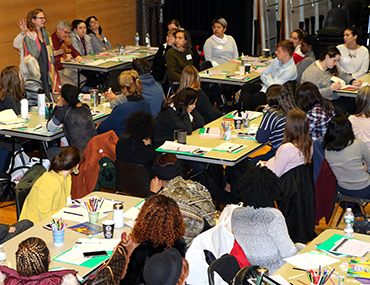On November 8, Bank Street Graduate School of Education hosted its Emotionally Responsive Schools Conference, an annual event inviting early childhood, elementary, and middle school educators to participate in a day of collaboration and hands-on learning focused on child development, social and emotional learning, and techniques for building supportive relationships and school communities.
In a resonating keynote presentation, “When Education and Mental Health Hold Hands: A Walk Through the Secret Life of Classrooms,” Lesley Koplow, GSE ’79, Director of Emotionally Responsive Practice (ERP) at Bank Street College, kicked off the day by speaking on how adults can support children by acting as “good mirrors” that acknowledge, reflect, and affirm emotions and experiences—both positive and negative.
 “If children’s life stories are considered to be irrelevant ‘excuses’ instead of essential and sacred foundations for understanding children and supporting their developmental process, those difficult life experiences will take up the child’s mental space and drown out voices of new learning,” said Koplow. “ERP-informed schools take in and hold the stories that children bring to school with them within strong and supportive teacher-child relationships and nurture children’s abilities to use symbolic processes to make sense of their experience and to give their feelings a voice.”
“If children’s life stories are considered to be irrelevant ‘excuses’ instead of essential and sacred foundations for understanding children and supporting their developmental process, those difficult life experiences will take up the child’s mental space and drown out voices of new learning,” said Koplow. “ERP-informed schools take in and hold the stories that children bring to school with them within strong and supportive teacher-child relationships and nurture children’s abilities to use symbolic processes to make sense of their experience and to give their feelings a voice.”
Koplow noted that symbolic processes—such as writing or drawing, playing, and using transitional objects—act as tools that can help children represent and communicate their experiences. Koplow shared several classroom anecdotes in which ERP-informed schools used these strategies to address the needs of individual students.
For example, a second-grade student learned to cope with anxiety related to the recent separation of his parents and a new living arrangement through a plan developed by his teacher and the school’s ERP consultant. During the school day, the student was having difficulty focusing and settling into his space. He was able to regain his emotional equilibrium by sitting in his teacher’s chair and holding her sweater when she was not available to engage with him. This symbolic solution enabled him to feel connected and supported by an adult he trusted during a period of change at home.
 “These vignettes illustrate the power of the teacher-child relationship in our children’s lives, as well as the need for mental health and education to ‘hold hands’ in order to support the well-being of our children in schools,” said Koplow. “When you listen to the stories, you can almost see and hear the ways that the children’s relationships with their teacher are buffering the stress, trauma, and isolation that they brought into the building.”
“These vignettes illustrate the power of the teacher-child relationship in our children’s lives, as well as the need for mental health and education to ‘hold hands’ in order to support the well-being of our children in schools,” said Koplow. “When you listen to the stories, you can almost see and hear the ways that the children’s relationships with their teacher are buffering the stress, trauma, and isolation that they brought into the building.”
In addition, Koplow called attention to the important role of school leaders in creating opportunities for teachers to partner with social workers through programs like ERP.
For the remainder of the day, participants attended breakout sessions, including, “Emotionally Responsive Literacy as a Reflective Technique,” “Teddy Bears Come to School: Using Transitional Objects in the Classroom,” and “Big and Small Feelings in the Classroom: Thinking About, Making, and Using Feelings Charts for All Ages,” among others.
To learn more about the Emotionally Responsive Schools Conference, click here. To read this year’s keynote presentation, click here (pdf).